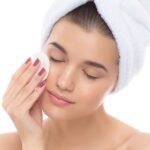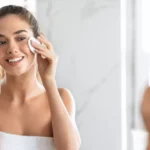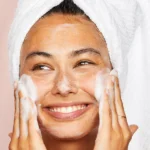Acne is a common skin issue that can be frustrating and uncomfortable. Many people look for natural remedies instead of over-the-counter or prescription treatments. These natural methods can help make pimples, sores, and acne scars look better.
Home remedies like herbal creams, essential oils, and supplements might help lessen acne. Acne happens when sebum mixes with dead skin cells and block pores. Then, bacteria like Propionibacterium acnes (P. acnes) can infect these blocked pores, causing pimples or cysts.
Things like some medicines, tight clothes, hormonal issues, genes, and smoking can also lead to acne. If you’re thinking about natural remedies for your acne, talk to a dermatologist first. They can help pick a safe and effective remedy for your skin type and acne type.
Key Takeaways : Treating Acne
- Natural remedies, such as herbal creams, essential oils, and supplements, may help improve acne symptoms.
- Acne is caused by a combination of sebum, dead skin cells, and bacteria clogging pores.
- Factors like medications, clothing, hormones, genetics, and smoking can contribute to acne development.
- It is important to consult a dermatologist before trying any new natural remedies to ensure safety and effectiveness.
- Incorporating lifestyle changes, such as a healthy diet and stress management, can also help prevent and manage acne.
What Causes Acne
Acne is a common skin issue that affects many people around the world. It happens when a mix of factors comes together. These include sebum production, dead skin cells, and acne-causing bacteria.
Sebum is an oily substance made by the skin. It’s key in acne development. When it mixes with dead skin cells, it can block the pores. This blockage lets acne-causing bacteria grow. This bacteria growth leads to whiteheads and blackheads, which can turn into inflamed pustules or cysts.
Other things can also cause acne. This includes certain medicines, changes in hormones, genes, and lifestyle choices like restrictive clothing and smoking. Some health issues, like endocrine disorders, can also lead to acne.
Knowing what causes acne helps in finding the right treatment. By dealing with the underlying factors, people can stop their pores from clogging. This can help reduce the look of blackheads and whiteheads.
| Common Causes of Acne | Description |
|---|---|
| Sebum Production | Excessive oil production by the skin’s sebaceous glands |
| Dead Skin Cells | Accumulation of dead skin cells that clog pores |
| Acne-Causing Bacteria | Overgrowth of bacteria, such as P. acnes, in clogged pores |
| Hormonal Changes | Fluctuations in hormones that can stimulate sebum production |
| Genetics | Inherited predisposition to developing acne |
| Medications | Certain prescription drugs that can cause or worsen acne |
| Lifestyle Factors | Stress, diet, and poor hygiene can contribute to acne |
Tea Tree Oil: A Natural Antibacterial
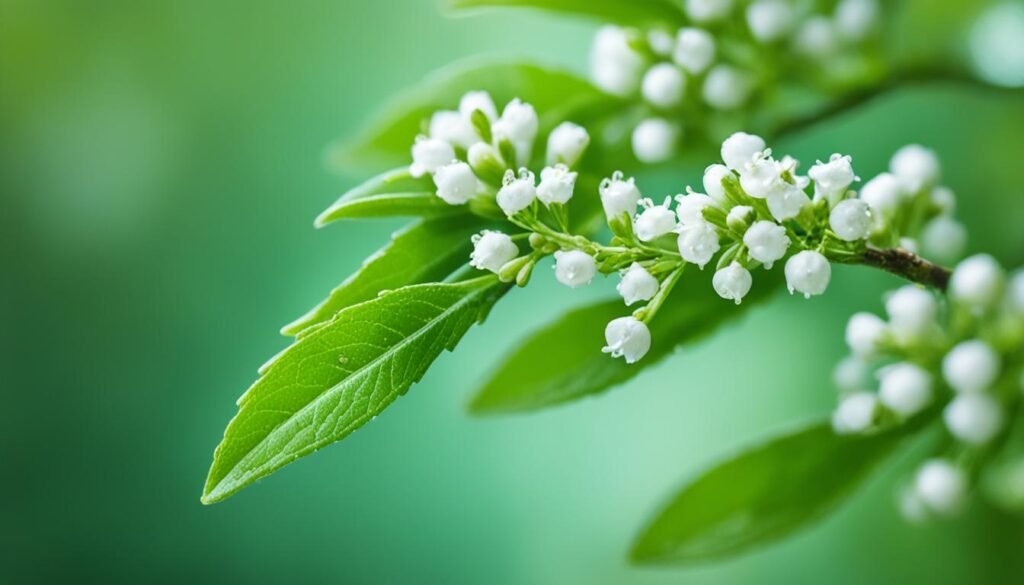
Tea tree oil is a powerful essential oil. It is known for its antimicrobial and anti-inflammatory properties. This natural remedy is great for treating skin issues like acne.
It works by fighting the bacteria that cause pimples and acne sores. This is why it’s so effective.
How to Use Tea Tree Oil for Acne
To use tea tree oil for acne, just follow these steps:
- Mix 1 part tea tree oil with 9 parts water in a clean container.
- Dip a cotton swab into the solution and gently apply it to the affected areas.
- Repeat this process 1 to 2 times per day, as needed.
Tea tree oil’s antimicrobial properties can kill the bacteria that cause acne. Its anti-inflammatory benefits also help reduce swelling and redness. A study in 2019 showed that tea tree oil can reduce the number of acne sores. This makes it a great natural choice for acne treatment.
“Tea tree oil is a powerful natural remedy that can help tackle acne at its source by targeting the bacteria that cause breakouts.”
Apple Cider Vinegar: Balancing Skin pH
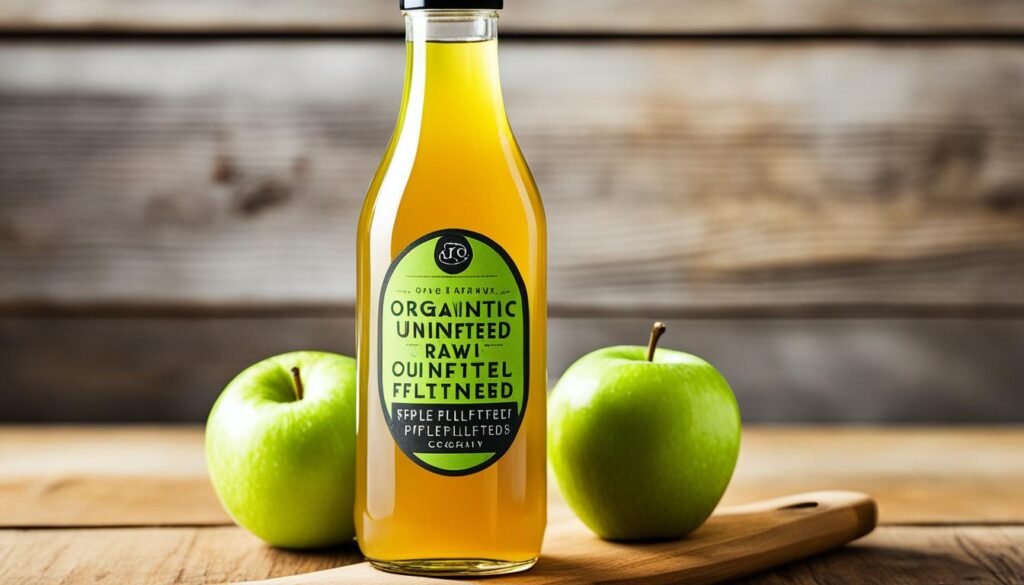
For those with acne, apple cider vinegar is a popular natural remedy. It might help manage acne breakouts, though the science is still limited. Some studies hint at its potential benefits.
The citric acid in apple cider vinegar could fight the P. acnes bacteria that causes acne. A 2016 study found that apple cider vinegar and other treatments reduced this bacteria. This could lead to clearer skin.
Research also suggests that apple cider vinegar might lessen acne scarring. But, not all skin experts support its use. They worry it could irritate the skin because it’s acidic.
To safely use apple cider vinegar for acne, mix it with water. Aim for 1 part vinegar to 3 parts water, or more water if your skin is sensitive. Apply it with a cotton ball, wait 5 to 20 seconds, then rinse and dry. Do this 1 to 2 times a day if needed.
| Ingredient | Potential Benefits | Considerations |
|---|---|---|
| Apple Cider Vinegar |
|
|
Apple cider vinegar might be a good natural acne solution, but be careful. Talk to a dermatologist before adding it to your skincare routine, especially if your skin is sensitive.
“The use of apple cider vinegar for acne is a complex topic, with both potential benefits and risks. While it may help in certain cases, it’s essential to balance its use with professional guidance and individual skin needs.”
Treating Acne with Green Tea
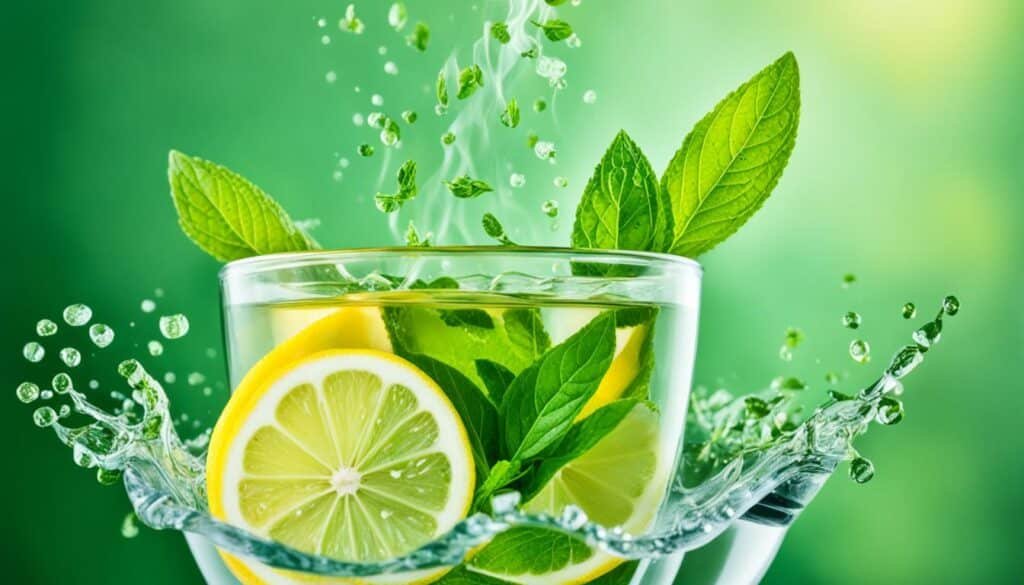
Green tea is a great natural remedy for acne. It’s full of catechins, which are powerful antioxidants. These help people with acne a lot.
Research shows green tea’s antioxidants can tackle acne at its roots. Too much sebum and P. acnes bacteria cause acne. Green tea has compounds that can lower sebum and P. acnes, reducing inflammation and whiteheads and blackheads.
Green Tea’s Antioxidant Benefits
A 2017 study showed green tea can cut down whiteheads and blackheads by 79–89% in 8 weeks. This proves green tea’s antioxidants are strong against acne.
“The antioxidant benefits of green tea may help fight acne by reducing the skin’s sebum production, reducing P. acnes bacteria, and reducing inflammation.”
Adding green tea to your skincare can help control sebum production, stop P. acnes bacteria, and lessen inflammation. These are key for clearer, healthier skin.
Honey and Cinnamon: A Natural Antibacterial Mask
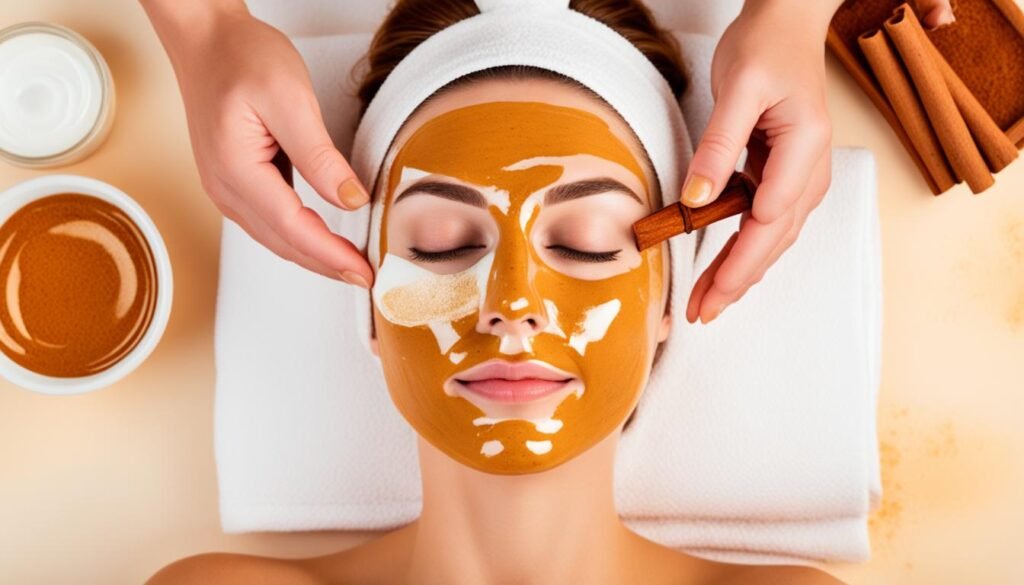
The mix of honey and cinnamon is a popular choice for fighting acne naturally. A 2017 study showed that this combo is strong against P. acnes, the main bacteria causing acne.
Research in 2020 found that honey can stop or kill P. acnes bacteria. But a 2016 study said using honey after antibacterial soap didn’t help more than the soap alone.
To make a mask, mix 2 tablespoons of honey with 1 teaspoon of cinnamon. Put it on clean skin for 10-15 minutes, then rinse well. Remember, cinnamon might irritate your skin, so test it first.
| Ingredient | Benefit |
|---|---|
| Honey | Antibacterial, anti-inflammatory properties |
| Cinnamon | Antimicrobial, potential to irritate skin |
“The combination of honey and cinnamon has shown promise as a natural, effective treatment for acne, thanks to their combined antibacterial and anti-inflammatory properties.”
Zinc: An Essential Nutrient for Acne

Zinc is a key nutrient for fighting acne. It has strong anti-inflammatory effects. This makes it a great tool against acne and redness.
A 2020 study looked at zinc’s effects on acne. It found that zinc helped reduce inflamed blemishes more than not using zinc. This shows zinc could be a good part of treating acne.
The most you should take is 40 mg of zinc daily. Taking more can cause stomach pain and gut irritation. Remember, putting zinc on your skin doesn’t work well because it doesn’t get absorbed well.
| Nutrient | Potential Benefits for Acne | Recommended Daily Intake |
|---|---|---|
| Zinc | Anti-inflammatory, may reduce inflamed acne lesions | 8-11 mg for adults |
Even though we need more studies, oral zinc supplements could help with acne. But, take them carefully and with a doctor’s advice.
“Zinc has been shown to be effective in reducing the severity of acne lesions, particularly inflamed blemishes.”
Lifestyle Changes to Prevent Acne

Alongside natural remedies, making some lifestyle changes can greatly help in keeping your body healthy and reducing acne risk. It’s important not to touch, rub, squeeze, or pop acne sores as it can make things worse by adding more bacteria. Instead, use mild, pH-balanced cleansers and oil-free, noncomedogenic skin care products to keep your skin clean and stop pimples from getting worse.
Drinking enough water is key, as it helps new skin cells grow and heal pimples. Also, cutting down on stress is crucial, as stress can make your body produce more oil, which can lead to acne. Here are some ways to manage stress:
- Talking to supportive people
- Getting enough sleep
- Eating a healthy, balanced diet
- Engaging in regular exercise
- Practicing relaxation methods like meditation or yoga
By making these lifestyle changes, you can take steps to prevent and manage acne, leading to clearer, healthier skin dermatology american academy american academy lotion.
| Lifestyle Factor | Impact on Acne |
|---|---|
| Avoiding touching pimples | Prevents the introduction of more bacteria and worsening of the pimple |
| Using mild, pH-balanced cleansers | Keeps the skin clean without irritating or drying it out |
| Choosing oil-free, noncomedogenic products | Prevents clogged pores and further breakouts |
| Staying hydrated | Supports the development of healthy new skin cells as sores heal |
| Reducing stress | Helps manage androgen levels and oil gland activity, decreasing acne risk |
Also Read : What Are Essential Skincare Tips For Beginners?
Conclusion
Home remedies like essential oils and natural supplements might help with acne, but their proof is not strong. For many, medical treatments work best. This includes over-the-counter and prescription drugs. If you have tough or ongoing acne, seeing a dermatologist is a good idea. They can find the best treatment for your skin.
Acne is a common skin issue that can be handled with home and medical treatments. But, not all home remedies work the same way. Before trying natural treatments, talk to a dermatologist. This ensures they won’t clash with any over-the-counter or prescription medications you’re on.
The best way to fight acne is often a mix of lifestyle changes, natural remedies, and medical treatments. With a dermatologist, you can create a plan that targets your acne’s root causes. This way, you can get clearer, healthier skin.
FAQs
Q: What are the different types of acne that can occur?
A: The different types of acne include acne vulgaris, which is the most common type, as well as cystic acne, hormonal acne, and mild acne. Each type presents its own challenges and may require different acne treatments.
Q: How can I help prevent acne from occurring?
A: To help prevent acne, maintain a consistent skincare routine that includes cleansing, exfoliating, and moisturizing with products labeled as non-comedogenic. Additionally, avoid touching your face and consider dietary changes, as certain dairy products can make acne worse.
Q: What treatments for acne are available without a prescription?
A: Many acne treatments you can buy without a prescription include products that contain benzoyl peroxide and salicylic acid. These ingredients help unclog pores and clear up acne effectively.
Q: Can certain foods make acne worse?
A: Yes, certain foods, particularly dairy products and high glycemic index foods, may make acne worse. It’s advisable to monitor your diet and see if any specific foods trigger your acne.
Q: What should I do if my acne is severe?
A: If you have severe acne, it’s best to talk to your doctor or a dermatologist who may recommend stronger treatments, possibly including topical antibiotics or medications that require a prescription.
Q: Is it possible for acne to leave permanent scars?
A: Yes, if acne is not treated properly, especially painful pimples or cystic acne, it can lead to permanent scars. It’s crucial to treat acne promptly to minimize the risk of scarring.
Q: How can I identify if I have mild acne or a more severe condition?
A: Mild acne typically includes occasional pimples or blackheads, while severe acne may consist of painful cysts and numerous inflamed lesions. If you’re unsure, consider consulting with a dermatologist to develop a treatment plan.
Q: What is the role of topical products in acne treatment?
A: Topical products play a significant role in acne treatment as they can directly target the skin condition. Products that contain active ingredients like benzoyl peroxide or salicylic acid help to clear acne and prevent future breakouts.
Q: How long does it take for acne to clear up with treatment?
A: The time it takes for acne to clear up varies depending on the type of treatment and the severity of the acne. Generally, with consistent use of acne-fighting products, many people can start to see improvement within a few weeks.
Source Links
- https://www.medicalnewstoday.com/articles/322455
- https://health.clevelandclinic.org/home-remedies-for-acne
- https://www.healthline.com/nutrition/13-acne-remedies
